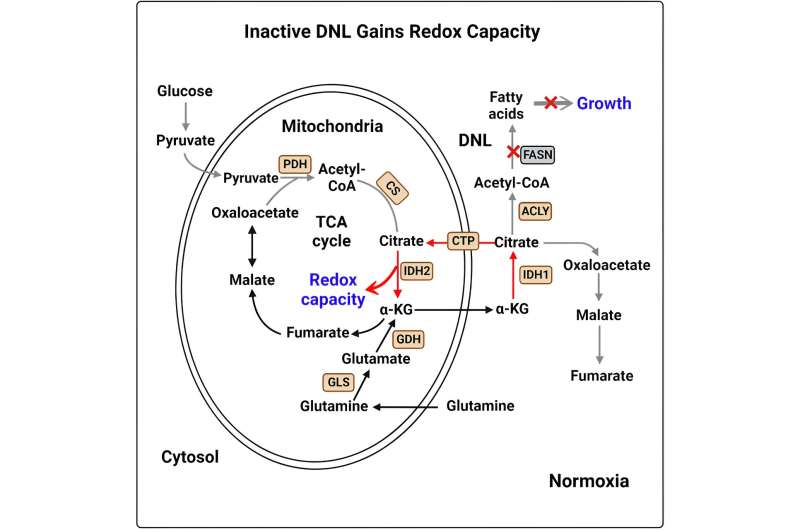This article has been reviewed according to Science X's editorial process and policies. Editors have highlighted the following attributes while ensuring the content's credibility:
fact-checked
peer-reviewed publication
trusted source
proofread
Scientists identify new therapeutic target for metastatic cancer

In a recent study led by Lei Jiang, Ph.D., an assistant professor of molecular and cellular endocrinology, a team of researchers from City of Hope and the University of Texas Southwestern Medical Center, found a potential new target for treating patients with metastatic cancer. Their findings were published in the August 29 issue of the journal Cell Reports.
The goal of the team's study was to elucidate the role of reductive carboxylation in redox metabolism, a process believed to be important for metastatic cancer. Reductive carboxylation is best known as a metabolic pathway that provides a molecule called acetyl-CoA so that it can be turned into lipids, which is mediated by fatty acid synthase (FASN). The FASN-mediated lipogenesis process supports rapid growth in most proliferating cancer cells, and increased FASN expression has been viewed as a metabolic feature of cancer cells. Thus, FASN is considered a potential target to block tumor growth.
In their new paper, Jiang and colleagues used lung cancer cells to show that FASN inhibition induces reductive carboxylation, which further increases redox capacity (a process central to metabolism) in metastatic cancer cells. In this setting, reductive carboxylation induces a net cytosol-to-mitochondria citrate flux in FASN-deficient cells. This was surprising because citrate flux across mitochondria—one way that cancer cells gain energy—has been previously known to only go in the mitochondria-to-cytosol direction. Importantly, blocking this cytosol-to-mitochondria citrate flux effectively induces oxidative stress and cell death in metastatic cancer cells.
Previous work by Jiang and others found that adaptation to anchorage independence in cancer cells (meaning they can proliferate without another surface to anchor with) requires a fundamental metabolic change in the citrate metabolism—a lipogenic precursor for de novo lipogenesis—via reductive carboxylation to suppress oxidative stress. However, the role of fatty acid synthase (FASN), a critical lipogenic enzyme, in reductive carboxylation during metastatic progression was unclear prior to the new study.
Building on prior research, this study provides additional data to support Jiang and his team's belief that targeting the cytosol-to-mitochondria citrate flux process can be an effective therapy for treating cancer patients with metastasis. Since the role of FASN in metastasis is context dependent, the team plans to test whether a similar mechanism exists in other cancer types beyond lung cancer.
More information: Wenting Dai et al, FASN deficiency induces a cytosol-to-mitochondria citrate flux to mitigate detachment-induced oxidative stress, Cell Reports (2023). DOI: 10.1016/j.celrep.2023.112971



















